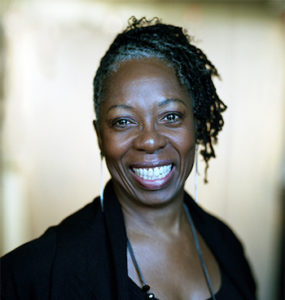
Jawole Willa Jo Zollar
*Jawole Willa Jo Zollar was born on this date in 1950. She is a Black dancer, teacher, and choreographer of modern dance.
She was born Willa Jo Zollar in Kansas City, Missouri, the sixth child of Alfred Zollar Jr. and Dorothy Delores Zollar. From age seven to seventeen, Zollar received her dance education from Joseph Stevenson, a former student of Katherine Dunham. Zollar also had early training in Afro Cuban and other native dance forms, which later helped to shape her teaching aesthetic.
After high school graduation, she received a Bachelor of Arts in dance from the University of Missouri at Kansas City. Zollar received her Master of Fine Arts from Florida State University and is currently a tenured dance professor. In 1980, Zollar moved to New York City, where she studied under Dianne McIntyre, artistic director for Sounds in Motion Dance Company. Zollar's choreographic style is influenced by the dance traditions of Black Americans—modern dance, African dance, and social dance.
Her movement synthesizes influences from contemporary dance (a combination of Dunham, Graham, Cunningham, and Limón techniques), Afro Cuban, Haitian, and Congolese dance. She emphasizes using weight and fluidity instead of creating clean shapes. From her Afro Cuban dance training, she employs a strong sense of dynamic timing, rhythmic patterns, and continuous flow of movement. She derives many of her movement ideas from African American culture, allowing the "church testifying, emotional energy shape the form, and the rawness of that form, like you, have in jazz," she says.
In 1984, she left the company and established the Urban Bush Women, the first major dance company of all-female African American dancers. In her choreography, Zollar creates avant-garde dance-theater productions that speak from the Black female perspective. Her pieces are collaborative performances between dancers, vocalists, artists, actors, composers, and musicians, including vocalizations, Cappella singing, storytelling, and social commentary. Through these mediums, Zollar pushes toward social awareness and change.
Zollar also explores African American folk traditions and the reality of the black woman's experience, tackling uncomfortable and controversial social topics such as abortion, racism, sexism, and homelessness in a hard-edged and straightforward way. Many dance critics say that Zoller's company makes a point to show the reality of African American culture, revealing how black Americans express themselves when not in the presence of whites.